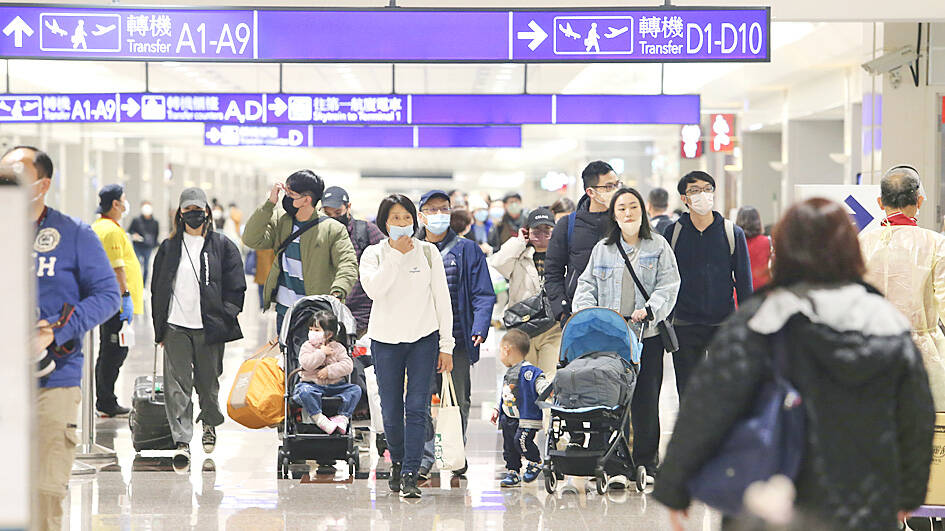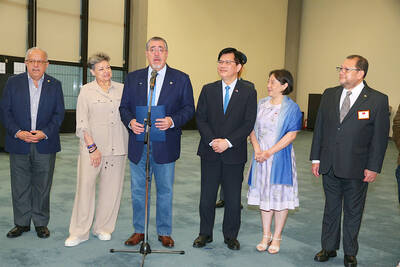The Executive Yuan yesterday approved a Tourism Bureau proposal to allocate NT$5.3 billion (US$174.31 million) from last year’s surplus tax revenue to attract international tourists in the next three years.
The bureau has funding to distribute the money — NT$5,000 each — to 500,000 international visitors, bureau Director-General Chang Shi-chung (張錫聰) told a news conference at the Ministry of Transportation and Communications in Taipei.
“The money will be given out through multiple tourism promotion events this year, rather than giving it all out at once,” Chang said. “As such, not all international tourists would receive it.“

Photo courtesy of Taiwan Taoyuan International Airport
“International tourists who are given NT$5,000 will not receive it until they arrive,” he said. “It will be stored in an electronic ticketing card, which can be used to pay for food, accommodation and other travel expenses during their time here.”
The bureau would also offer incentives for domestic and overseas travel agencies to bring international tourists to Taiwan, Chang said.
A tour group from overseas would receive a subsidy of NT$10,000 if it has eight to 14 members and NT$20,000 if it has more members, he said, adding that there was enough money for 90,000 groups.
To address staffing shortages in the hotel industry, the government would help pay the salaries of new hotel employees, he said.
“Hoteliers will receive a bonus of NT$5,000 per month for each new staff member they hire,” Chang said. “It will help raise the monthly salary of entry-level hotel employees in Taipei, Taoyuan, Hsinchu, Keelung and New Taipei City to NT$33,000 or more.”
“Hotel employees in other administrative regions would see their monthly salaries rise to or above NT$31,000,” he added.
The bonus could continue for up to one year, he said, adding that employers must not lower the salaries once the funding ends.
The bureau is planning to focus on attracting tourists from Japan, South Korea, Europe, North America and target countries of the New Southbound Policy, Chang said.
The 18 countries defined in the policy are: Australia, Bangladesh, Bhutan, Brunei, Cambodia, India, Indonesia, Laos, Malaysia, Myanmar, Nepal, New Zealand, Pakistan, the Philippines, Singapore, Sri Lanka, Thailand and Vietnam.
The goal is to attract 6 million international tourists this year, Chang said.
High-Quality of Travel Association chairman Ringo Lee (李奇嶽) said that the government should ensure that more sectors can benefit from the cash distribution to international tourists.
“The government should strive to have more international tourists visit central, southern and eastern Taiwan, not just the north,” Lee said.
While it is important to offer incentives for overseas travel agencies to organize tour groups to Taiwan, the government should also encourage them to stay in hotels and hire tour buses run by Taiwanese operators, he said.
“The number of Taiwanese traveling overseas has far exceeded the number of inbound tourists,” Lee said.
“Compared with nearby countries, we are relatively late in reopening the borders for international tourists and have fewer means to conduct international tourism marketing,” he added.
The government should also restart all cross-strait flight routes, which would boost inbound and outbound tours, he said.

Greenpeace yesterday said that it is to appeal a decision last month by the Taipei High Administrative Court to dismiss its 2021 lawsuit against the Ministry of Economic Affairs over “loose” regulations governing major corporate electricity consumers. The climate-related lawsuit — the first of its kind in Taiwan — sought to require the government to enforce higher green energy thresholds on major corporations to reduce emissions in light of climate change and an uptick in extreme weather. The suit, filed by Greenpeace East Asia, the Environmental Jurists Association and four individual plaintiffs, was dismissed on May 8 following four years of litigation. The

A former officer in China’s People’s Liberation Army (PLA) who witnessed the aftermath of the 1989 Tiananmen Square massacre has warned that Taiwan could face a similar fate if China attempts to unify the country by force. Li Xiaoming (李曉明), who was deployed to Beijing as a junior officer during the crackdown, said Taiwanese people should study the massacre carefully, because it offers a glimpse of what Beijing is willing to do to suppress dissent. “What happened in Tiananmen Square could happen in Taiwan too,” Li told CNA in a May 22 interview, ahead of the massacre’s 36th anniversary. “If Taiwanese students or

DIPLOMACY: It is Guatemalan President Bernardo Arevalo’s first visit to Taiwan since he took office last year, while Eswatini’s foreign minister is also paying a visit A delegation led by Guatemalan President Bernardo Arevalo arrived in Taiwan yesterday afternoon and is to visit President William Lai (賴清德) today. The delegation arrived at Taiwan Taoyuan International Airport at 4:55pm, and was greeted by Minister of Foreign Affairs Lin Chia-lung (林佳龍). It is Arevalo’s first trip to Taiwan since he took office last year, and following the visit, he is to travel to Japan to celebrate the 90th anniversary of diplomatic relations between the two countries. Arevalo said at the airport that he is very glad to make the visit to Taiwan, adding that he brings an important message of responsibility

STAY AWAY: An official said people should avoid disturbing snakes, as most do not actively attack humans, but would react defensively if threatened Taitung County authorities yesterday urged the public to stay vigilant and avoid disturbing snakes in the wild, following five reported snakebite cases in the county so far this year. Taitung County Fire Department secretary Lin Chien-cheng (林建誠) said two of the cases were in Donghe Township (東河) and involved the Taiwan habus, one person was bit by a Chinese pit viper near the South Link Railway and the remaining two were caused by unidentified snakes. He advised residents near fields to be cautious of snakes hiding in shady indoor areas, especially when entering or leaving their homes at night. In case of a